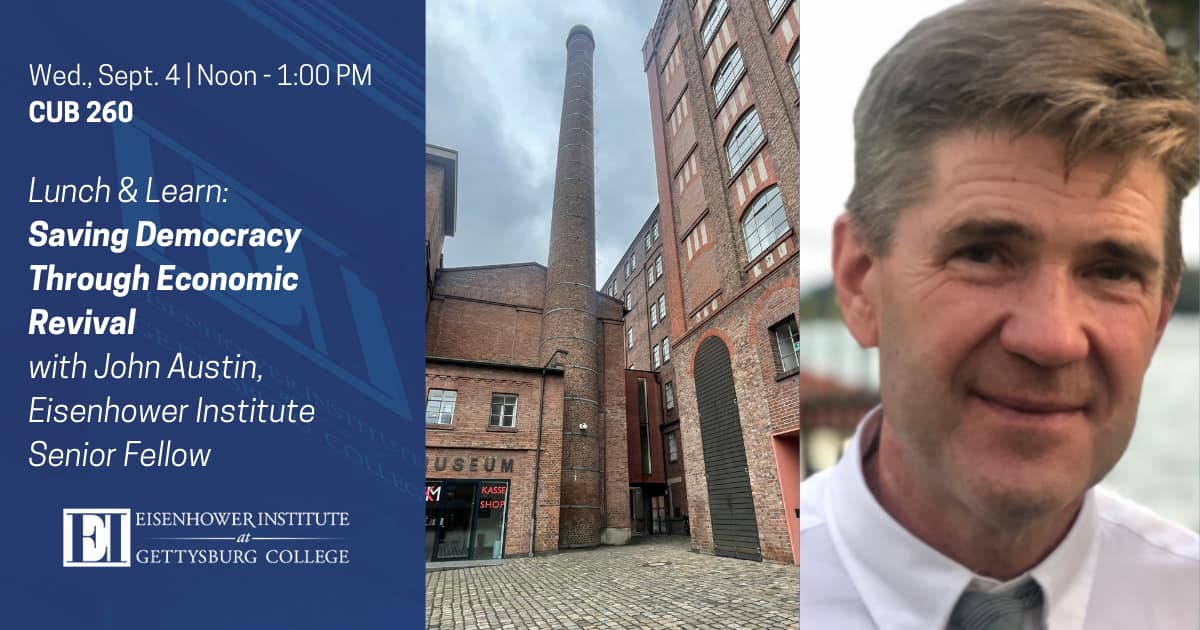Economic Revitalization Focus of New Eisenhower Institute Senior Fellow Talk

The Eisenhower Institute hosted new senior fellow John Austin for a Lunch and Learn on economic revitalization. (Photo courtesy Eisenhower Institute)
By Hugh Toner, Contributing Writer
On Tuesday, the Eisenhower Institute hosted its first Lunch and Learn event of the year, called “Saving Democracy Through Economic Revival.” The event, led by EI Senior Fellow John Austin, focused on economic revitalization in industrial regions.
Austin, the newest addition to the EI Fellows, has worked closely with the institute in the past and contributed to the design of a number of their experiential learning programs He works as a director for the Michigan Economic Center and as a lead organizer in the development of the transforming industrial heartlands Initiative, an international collaboration focused on improving the economic conditions of industrial regions in North America and Europe. He is also a nonresident fellow at the Brookings Institute.
EI Executive Director Tracie Potts gave a brief introduction, welcoming students and faculty back to campus and introducing the speaker.
Austin began by sharing his personal background when he was a student when he first became interested in economics and public policy work in high school.
“I took an economics course in high school, and it appeared to me, ‘woah,’ this economics stuff runs the world; it shapes lives,” he said.
Austin studied economics at Swarthmore College and then moved to Massachusetts, where he worked in the office of then-Governor Michael Dukakis. During this time, he worked on Walter Mondale’s 1984 presidential campaign and then for Dukakis’ presidential bid in 1988.
While living in Flint, Michigan, Austin focused on improving the economic conditions of industrial regions. He again became involved in local politics, serving on the Michigan School Board for 16 years, six of which he served as president.

Headshot of EI senior fellow John Austin, who gave a talk in CUB 260 on Wednesday, Sept. 4. (Photo courtesy Eisenhower Institute)
“I ended up working on local community leadership and education developments in Flint, and from there, I found myself working on broader things,” he said.
Austin then discussed the challenges facing industrial communities in economic decline.
He described how visiting industrial communities in Europe and throughout the rust belt gave a new perspective on how to combat their economic issues, saying, “When I was with the leaders of these great industrial cities of the midwest, and we spent time together, I realized that were all trying to do the same thing. We all have similar assets that we can leverage for economic growth.”
His experiences led him to found the Michigan Economic Center, a think tank geared specifically to solving the Rust Belt state’s economic problems. Austin emphasized the need for sustainable economic growth and the role of technological innovation in creating new opportunities, citing examples such as the growing developments due to the “blue economy” of Milwaukee.
“Milwaukee was the first big industrial community that saw the emerging blue economy as its future,” he said. “In the Great Lakes, many waterfront communities have an industrial history with similar kinds of bones.”
Additionally, he noted the importance of community engagement and strong local leadership in driving economic growth in industrial regions. He stated that the key to success in these policy solutions comes from the involvement of the community in the policy creation process.
“The solutions have to come from the community, from the citizenry. They have to be the ones to design their own, better future… it starts with that kind of community vision,” he stated.
John Austin concluded his presentation by answering open questions from the audience, and reiterating the importance of community engagement and being an active participant in public service.
